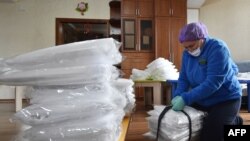The Kyrgyz government is tightening media regulations, as the country fights the coronavirus pandemic.
In many countries, the media has been recognized as an essential service, exempt from quarantine regulations. But in Kyrgyzstan, many reporters say they are under pressure to stay home.
Authorities have allowed some state TV crews to work in the field, but most journalists are barred from traveling or conducting interviews from quarantined areas, local journalists say.
News outlets say they are struggling to understand the rules, which officials say are under review, and that there is a lack of transparency and accountability.
During the pandemic, the government has become the only source of news, some journalists say, adding that authorities are using the health crisis as an excuse to limit the media’s work.
The capital, Bishkek, and the southern cities of Osh and Jalal-Abad remain under quarantine. As of Monday, the country had 568 coronavirus cases and seven deaths. President Sooranbai Jeenbekov has imposed a curfew, and people are only allowed outside their homes for essential services.
Kyrgyz officials have told journalists to follow daily online briefings and to submit questions online or via social media.
During a March 30 briefing, Almazbek Orozaliyev, deputy minister of internal affairs who is also enforcing emergency measures in the capital, said that all sectors, including the media, must follow the emergency laws.
“These are temporary measures taken with the best interests of our people, their safety and security,” he said. Orozaliyev added that officials would be available via WhatsApp to answer questions.
Orozaliyev said accreditation was not an issue because reporters should be working virtually or from a distance, adding, “We want journalists to stay safe and healthy and follow the emergency rules.”
Barriers to coverage
But the Media Policy Institute, a non-governmental organization based in Bishkek, said the barriers to journalism were unconstitutional.
Altinay Isayeva, a legal expert at the institute, said the nation’s legal framework should be a buffer that defends the work of journalism, even in a health crisis.
“Our analysis of the Kyrgyz constitution shows that emergency measures should not ban or limit any media activity. But authorities are doing precisely that by requiring a special accreditation,” Isayeva said.
“There are apparently special rules now, but they are not clear. So, it’s becoming increasingly difficult for our press to do its job,” Isayeva added.
A group of Kyrgyz journalists appealed to Jeenbekov, Kyrgyzstan’s Parliament and other officials and bodies to refrain from restricting media freedom.
“Only two state channels are allowed to report from the areas under emergency measures. This is a major blow to access to information,” said Elina Karakulova, country director of Internews Kyrgyzstan, a U.S.-funded media development network.
“Media are struggling to perform their basic tasks, which are to collect and present news on location. Journalists are not allowed to travel, can’t do interviews or engage the public,” said Karakulova.
“It’s not enough to report from home. You can’t just rely on official statements and briefings to analyze what’s happening in the country. Journalists want to find out the economic situation in these areas, what it is like to live in these parts of Kyrgyzstan,” Karakulova said.
The presidential administration recommended that the state emergency office review its media regulations, but Orozaliyev told journalists last week that no change has been made.
“Fighting coronavirus is a unique challenge for all of us. We must all do our best to ensure that what we do helps our country. So, let’s push our political debates aside and provide and deliver accurate news. We hope our media community will agree with us and follow our guidance,” Orozaliyev said.
Limited information
Journalists in Kyrgyzstan enjoy relatively more freedom than other Central Asia countries, but the Organization for Security and Co-Operation in Europe (OSCE) and Human Rights Watch have said the media environment is deteriorating.
In December, Harlem Désir, OSCE representative on freedom of the media, warned that the country had “disproportionate” defamation claims against media outlets.
Journalists said that when access to information is limited, people tend to rely more on what they see on social media.
Osh-based independent journalist Shohruh Saipov said that the public needs reliable sources of information. Otherwise, he said, their only option is to follow content on social networks, which can lack accuracy and balance, or include disinformation.
“As they limit the independence and freedom of media, our government is pushing its own one-sided agenda. But our people are reading something different on social media, especially in terms of numbers of infection cases, patients and conditions,” Saipov said.
“A lot of it could be a total lie,” Saipov said, adding that instead of “accusing them of disseminating false information, the government should just create space for media to do their job.”
This story originated in VOA’s Uzbek Service.





